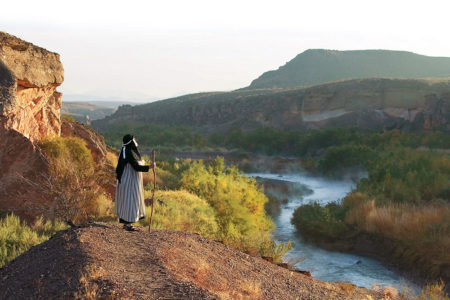Muhammad Versus the Messiah
Iraqi President Saddam Hussein’s recent exercise in aggression against “brother” nation Kuwait shook a largely passive global population with the facts of the perilous realities of life in the Middle East. Americans quickly took notice of the Iraqi invasion as, within hours, prices at the gas pumps began to spiral upward. Our much-taken-for-granted Mideast oil source was once again prey to the designs of a tyrant intent on controlling price and supply in order to equip and maintain a foreboding military strike force. Hapless Kuwaitis were intended to become a showcase illustration to whip Arab nations into line and recognize the Butcher of Baghdad as the undisputed leader of the Arab world. If this could be achieved, and oil-dependent nations were prevented from intervening, the world would be forced to reckon with a new imperialist who possesses both the means and the will to create regional and global havoc.
The War Option
Iraq’s military buildup and aggressive ambitions opened a new chapter in the never-ending struggle to survive in the Middle East. And, of course, Israel is at the epicenter of the impending cataclysm. Hussein’s threat to “scorch half of Israel” with poison gas is backed by his track record in Iraq’s war with Iran and against Kurdish people in his own country, which demonstrates emphatically that this new Hitler’s threats are much more than rhetoric. Military experts confirm that it is well within the realm of possibility for Iraq to mass 100,000 troops on Israel’s borders within 24 hours. Arab allies could swell that number to a huge strike force. Arab nations who oppose Hussein’s suppression of Kuwait, and are generally divided on a multitude of issues, are united in their desire to destroy Israel. For example, Iraq, Jordan, and Syria possess a combined tank force that far exceeds the numbers maintained by NATO. The possibility is, therefore, very real—unless military intervention circumvents it—that Arab militants may now believe the time is right to strike a deathblow for Allah and his prophet Muhammad against Israel and the hated Jewish presence in the Mideast.
Saddam Hussein has followed the classic pattern of behavior spoken of in Genesis to describe the character and methods of his progenitor, Ishmael: “And he will be a wild man; his hand will be against every man, and every man’s hand against him” (Gen. 16:12). This insures that the strongest and most brutally aggressive will always be the force to be reckoned with in the Arab world.
Abraham or Allah
The impetus behind the Arab determination to destroy Israel cannot be narrowly defined as a family affair, even though both entities are direct descendants of Abraham. Yes, there was the matter of engendered jealousy over Ishmael’s being passed over as the recipient of the Abrahamic covenant. That blessing and the promise of perpetual ownership of the land of Israel fell to Isaac and his heirs: “And God said, Sarah, thy wife, shall bear thee a son indeed; and thou shalt call his name Isaac: and I will establish my covenant with him for an everlasting covenant, and with his seed after him” (Gen. 17:19).
But Ishmael was also given the promise of becoming “a great nation” (Gen. 21:18)—a nation so great “that it shall not be numbered for multitude” (Gen. 16:10). That promise has been faithfully fulfilled by God. Tiny Israel floats in the middle of a sea of Arab nations scattered across a large portion of the globe.
There are basically two differences between God’s covenants with the Jews and the Ishmaelites. Israel was specifically given the land called Palestine, or Israel (Gen. 13:14–17; 17:6–8; 17:19–21; 28:3–4). The paramount difference, however, is discovered in these words: “And I will bless them that bless thee, and curse him that curseth thee: and in thee shall all families of the earth be blessed” (Gen. 12:3). The promise is further defined in Genesis 22:18: “And in thy seed shall all the nations of the earth be blessed.” That “seed” of blessing delivered to the Gentile nations through the Jewish people—including Arabs—was the Messiah. “Now to Abraham and his seed were the promises made. He saith not, And to seeds, as of many; but as of one, And to thy seed, which is Christ” (Gal. 3:16). Jewry’s presence and assigned mission were, therefore, uniquely set apart in marked contrast to those described as characteristic of Ishmael’s seed and national legacy.
The “seed” component in God’s program for humanity surpasses every other aspect of history. In addition to being a Savior of men, Messiah is to be King. When His kingdom finally arrives, He will establish and enforce stability. Delivery of the one who could so bless mankind was the exclusive province of Abraham’s seed through Isaac. The promise is specific. The Abrahamic Covenant provided:
- A King for the throne: “and kings shall come out of thee” (Gen. 17:6).
- A land for the King: “And I will give unto thee, and to thy seed after thee, the land wherein thou art a sojourner, all the land of Canaan” (Gen. 17:8a).
- A people for the King: “and I will be their God” (Gen. 17:8b).
But, unfortunately, it was the “blessing” aspect of the covenant that developed the same animosity in Esau’s posterity, because the blessing fell to Jacob rather than to Esau who fathered their people. Had the Arabs embraced obediently the Savior and kingly aspects of the blessing of the Messiah, history would have taken another course.
These residual resentments became deeply ingrained in the attitudes of the Arabs toward Israel, and those resentments spun off in manifold and discernible ways as the centuries passed. Scripture is replete with accounts of those heirs of Ishmael who warred against Israel while growling their determination to “Come, and let us cut them off from being a nation; that the name of Israel may be no more in remembrance. For they have consulted together with one consent” (Ps. 83:4–5). Their “one consent” was the extermination of the nation of Israel.
Since the days of the psalmist, Arab determination has not wavered. However, the entrance of the new religion, Islam (7th century A.D.), refined and sanctified the rationale. It became incumbent to subjugate or exterminate Jews “in God’s name.” A man named Sheikh As’ad Tamimi who claims leadership of the Islamic Jihad Beit al-Maqdis, focused the issue in a recent statement lauding Iraqi President Hussein’s tirade about unleashing chemical weapons against Israel. “I hope he is as good as his word,” Tamimi said. “The killing of Jews will continue, killing, killing in God’s name until they vanish.”
Thus the Allah discovered by Muhammad—who was familiar with both Judaism and Christianity (see Will Varner’s article)—was a very different god from the God of the two great religions found in the Bible. Muhammad’s religion, which, in his view, was to replace Judaism and Christianity, would have a new book (the Koran), a new look, and a new center of worship (Mecca).
The word Jihad was enshrined in the ecstatic vocabulary of the Muslim believer. To kill in the name of Allah, in Jihad (holy war), is a privilege. To die in Jihad is to be assured a place in Heaven. Consequently, military conquest became a theological pursuit, and conquered people became the subjects of Allah.
The religiously fired law of conquest swept Islamic armies into Syria, Israel, Mesopotamia, Egypt, North Africa, and Spain. The advance was finally stopped by Charles Martel, grandfather of Charlemagne, outside Paris in 732 A.D. Later, Muslim hordes encompassed Europe, moving as far west as Austria before being defeated in the late 17th century.
Subsequently, many of these areas, through erosion or military actions, were delivered from Muslim domination. The ultimate affront to Islamic ambitions was the deliverance of Jerusalem from the Muslim Ottoman Turks by the “Christian” British Expeditionary Force in 1917 and the return of Jewry to the land after 1948. Symbolically, the modern state of Israel stands as a constant reminder to rabid fundamentalist Muslims of their humiliation before infidels—a condition that can only be remedied through conquest.
This is a fact of life often misunderstood by those restrained by Western beliefs and standards, for the issue of land in the Middle East is not primarily a territorial matter. It is a question of religious dominance—the lack of which is intolerable to the Muslim who is taught that Allah is all and is to possess all. This is precisely why the rise of militant Muslim fundamentalists in Iran was viewed with such deep concern—a concern borne out more vividly with every passing day by the sight of captive American hostages on the nightly television news broadcasts.
An abiding tenet of Islam is that all lands are to be subject to Allah. Therefore, once a territory is taken, it must remain under Muslim domination. If land is lost, Jihad becomes necessary. Any concessions or treaties made with enemies under conditions making it impossible to restore dominion by force are observed only until means are available to remedy the situation.
For this reason, as Arab spokesmen have repeatedly avowed, any negotiated peace agreement with Israel will only provide a staging area from which to pursue total elimination of the Jewish presence from land claimed to be sacred to Allah. In such a perpetual state of conflict, Israelis know all too well what the Western world must learn or live to regret—survival against the Muslim onslaught means having superior strength and the will to use it.
The Second Wave
Make no mistake about it, Muslims are bent on possessing this planet for Allah, either by coercion or persuasion. And while, in the first wave, the swords of Islam were wet with the blood of vanquished “infidels,” a great second wave is now moving across the Western world in the form of Muslim missionary crusaders. In 1974, at a meeting of the World Muslim League, an “Islamic World Mission Board” was formed. Successes have mounted, and today Islam is one of the fastest growing religions in the world. The Islamic population worldwide now approaches one billion—one of every five people on earth.
In France, Islam ranks second only to Catholicism. England has received a massive influx of Muslims, so many that the face of the landscape has literally changed. In 1945 there was one mosque in England; in 1989 there were over one thousand. London is the site of the largest mosque in Western Europe.
The story is the same in North America. The first mosque in the United States was built in Cedar Rapids, Iowa, in 1934. Today there are over six hundred. Muslims lay claim to five million adherents to Islam in North America. If present trends continue, within three years Muslims will outnumber Jewish people in America (the Jewish population is currently approximately seven million).
Dr. Ismail Faruqui recently challenged Muslims to pursue a goal of 50 to 75 million new American converts to Islam. “Only from massive conversions,” Faruqui said, “can we hope to elect Muslim politicians, appoint Muslim judges, and incorporate the shar’iah into the judicial system. We must transcend our minority status to make Islam a dominant force in America and the West.”
In this regard, a point to ponder is the fact that students from Islamic countries now form the largest group of international students in North American universities and colleges.
For the most part, complacent Christians in North America have taken little or no interest in Islam’s advances. Many, in fact, see the strange looking buildings with their curious little crescents that are popping up everywhere as another denomination—just neighbors who take a strong stand for morality and against some of the things that we too are against. Such is not the case. Islam is not just another religion in town. Islam is not pluralistic. While Christians or Jews may lament the loss of one of their own to another religion, for Muslims conversion to another religion is a capital offense. Witness Salman Rushdie, a Muslim author, who did not convert but merely questioned Islam and who now lives under a perpetual death sentence from his brothers in the faith. And, as is being graphically demonstrated in the Mideast, when Muslims perceive that they have sufficient strength to take control one way or another, Islam will attempt to seize it.
Last July, Louis Farrakhan of the Nation of Islam led a meeting in Washington, D.C., with a defiant, foot-stomping, fist-waving demonstration before 15,000 mesmerized followers. While not taken seriously in many quarters, Farrakhan and his ilk should sound a warning of potential danger and cause people, particularly Christians, to awaken. Time magazine warns, “For them [Farrakhan’s Muslims] mainstream American values are inherently oppressive and racist, to be rejected at root. That leadership has tended to be fringe. It is fringe no longer. Farrakhan’s audience and appeal are growing. This year he will for the first time run candidates for Congress” (Time, July 23, 1990).
This man who plans to run candidates for Congress is vehemently anti-Semitic. He believes Libya’s Quddafi is a “True brother in the struggle.” “Zionism is racist … Smash Zionism,” runs his theme. “God is going to defeat the United States government!” “If they [black politicians] sell us out, they should be killed” (The New Republic, July 23, 1990).
Is this the raving of a fringe lunatic? No! It is the rationale of Jihad.
The Ultimate Conquest
The Word of God has forewarned us of the human heart’s capabilities and Satan’s bellicose attempts to thwart the gospel and destroy the Jewish people. Therefore, Muslim intentions—military or missionary—should not surprise, discourage, or distract us.
The point must be made—and reconfirmed—that in the abiding conflict among the world’s three major religions, there is only one transforming option. The Jewish people, in concert with biblical Judaism’s declared directive, saw the Messiah enter the world. Sadly, Jewry missed their Christ, while Islam has missed completely the point of what God accomplished in Him. The ultimate conquest is not territory, nor is it the satisfaction derived from destroying or subjecting people deemed weaker or inferior. It is, rather, the liberation that comes through faith in Jesus Christ.
Muhammad sought an alternative to Judaism and Christianity. He succeeded only in leading millions deeper into spiritual darkness. The knowledge that fresh millions are being led along the same path should awaken Christians to the need for increased world missions and intensified evangelistic efforts. As I looked at a huge picture of countless thousands of Muslim pilgrims on their faces around the sacred Kaba in Mecca, I was moved with a deep sense of sadness. They were kneeling in the wrong place, before an inanimate object that can bring neither light, life, nor peace. Better they should bow in homage, as their people one day will, at the feet of Jesus Christ—King of kings and Lord of lords.
And, being found in fashion as a man, he humbled himself and became obedient unto death, even the death on the cross. Wherefore, God also hath highly exalted him, and given him a name which is above every name, That at the name of Jesus every knee should bow, of things in heaven, and things in earth, and things under the earth, And that every tongue should confess that Jesus Christ is Lord, to the glory of God, the Father (Phil. 2:8–11).








Revisiting this article shows just how right Elwood McQuaid was in 1990. Thirty years later what he wrote has come to pass.